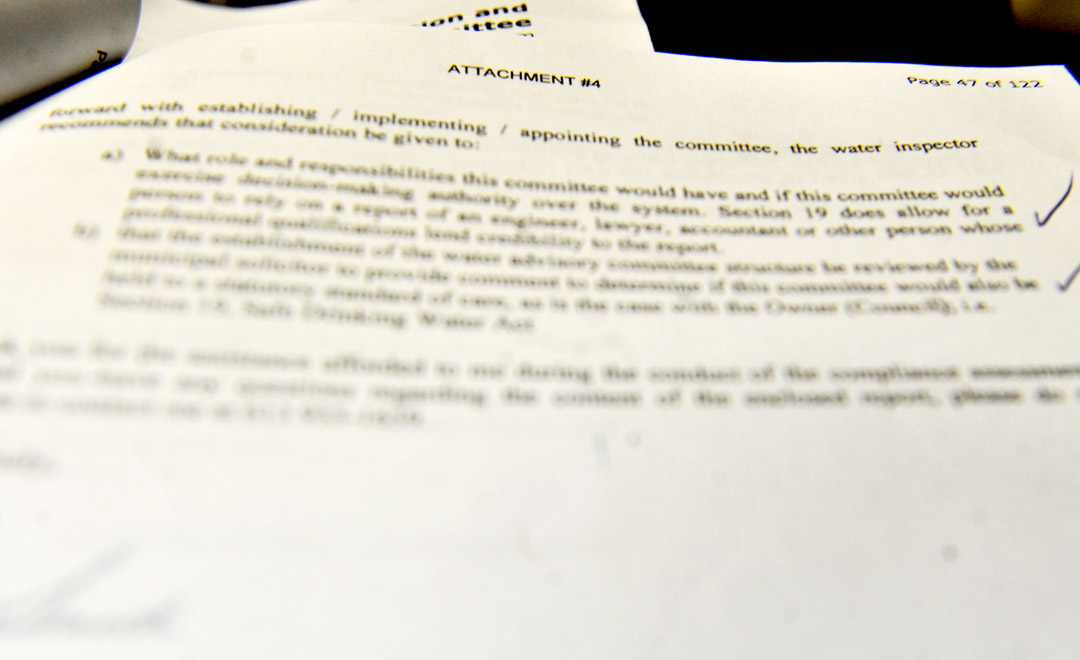
It started out as a process debate.
Gord Cameron, the chamber of commerce’s erstwhile city hall fiscal watchdog, finally got his time at the podium Tuesday to urge the finance, administration and operations committee to consider forming a separate committee to advise council on the water and sewer systems.
His presentation was filled with technical details about water rate increases, the division of costs between the regular and water/sewer budgets, the amount of time council spends on the water budget and the need for water users to be represented at the council table.
“There’s missed opportunity for efficiencies and improvements,” added Cameron.
I have argued in the past that such an oversight committee might be a good thing, given the complexity of the management involved and its potential impact on citizens’ wallets.
My support for the idea might be tempered somewhat by the introduction, in subsequent correspondence, of a liability element, as outlined in Tuesday’s story.
But still, I expected the entire thing to be hopelessly wonky and process-centric, which is why Councillor and finance committee chrairman Jane Fullarton’s reaction turned out to be a head-snapper.
She responded to Cameron’s presentation with a full-on expression of outrage.
What got the councillor’s goat was Cameron’s suggestion that “everybody in this room” does not have the time or inclination to go trough all that dry, technical stuff, and so requires a water advisory committee to filter it down.
To be fair, she was also offended by the notion that, unable to process all that dry detail, councillors and officials make arbitrary decisions on spending and rubber-stamp them without discussion.
Fullarton’s ability to show aggression from the mayor’s desk made one wonder why she never chose to run for mayor.
And while it did also seem a little disproportionate to the supposed offence, Fullarton’s response did provide the benefit of a side-debate on city councillors’ tolerance for technical detail.
When it comes to homework, Fullarton is definitely old-school.
She reads her package from start to finish, it would seem, to the point where, before voting on the motion that followed Cameron’s presentation, she insisted the committee first hear the quarterly water and wastewater systems report.
That report, said Fullarton, contained information pertinent to the water advisory committee debate.
When others failed to take note of that pertinent information, Fullarton even pointed it out: Two paragraphs in the fourth attachment that pointed to the liability issue, also known as the statutory standard of care.
Councillor Jason Baker later joked that Fullarton is “not a normal councillor” because of that degree of thoroughness.
Not usually one to agree with the formation of a potential new level of bureaucracy, Baker favoured the water committee exactly because, as a council veteran, he knows enough to know his own ignorance of technical details.
“I think there are some major deficiencies in my understanding of how the system operates,” said Baker.
For Fullarton, it’s all about attention.
“I make the time to do this job and I take it seriously,” she said.
Indeed, she does. But so does Baker.
And so does councillor Phil Deery, who, although enough of a details man to point to another paragraph in another attachment, nonetheless agreed with Baker, arguing that, on such technical issues, he is more concerned about the questions he does not ask.
There is no simple answer to the question of balance in civic governance.
Some, like the late councillor Bob Huskinson once did, throw themselves into the details to the point of being accused of meddling in the affairs of staff.
Others are ideas and vision people; they let staff take care of the details and concentrate on the broader direction of the city.
A good council, ideally, will have a bit of both.
And when an advisory committee can act as a bridge between these two governance philosophies, then why not let it happen?
Provided the poor advisers don’t end up in court.